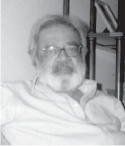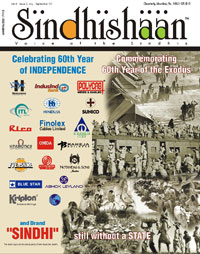REMEMBERING THE SLAIN
by - Amar Jaleel

“Earth provides enough to satisfy every man’s need, but not every man’s greed.” – Mohandas K. Gandhi
Exactly two years and eight days after America had dropped atom bombs on Hiroshima and Nagasaki in Japan, the traumatised world was jolted by unprecedented riots in the subcontinent that left millions of Muslim, Hindu and Sikh families uprooted and annihilated. On very few occasions before had more ghastly massacres taken place in the history of mankind. It was no less than a frightening volcanic eruption in the wake of partition of India, and coming into being of Pakistan.
The awful events that have plagued Pakistan since its inception leave us thinking, pondering, and perplexed. Everything has gone wrong with us. The magnitude of the riots was so frightening that you just can't brush aside the untold stories of horror and dread. It is the moral responsibility of the people of my age to convey it to the younger generation how one felt being alive in that dreadful era when life had lost its significance, its promise, its colours. Death in its utmost severity and nakedness had never ridiculed mankind like that before.
Men possessed by superstitions instinctively attribute ghastly happenings in the chequered history of Pakistan to the slaughter of the millions of Hindus, Muslims and Sikhs in the wake of its creation. It is the curse of the dead, they claim, but is ridiculed by others. The superstitious narrate puzzling instances relating to the fate of the leaders of the All India Muslim League -- the political party that had masterminded partition of India and the formation of an independent country, Pakistan.
1- Mohammed Ali Jinnah, the founding father of Pakistan, died in mysterious circumstances. Immediately after the creation of Pakistan it was revealed that he had been suffering from tuberculosis. The ailment aggravated after he became the Governor-General of Pakistan. His condition deteriorated in Karachi, the first capital of Pakistan. He moved to Ziarat, a summer resort near Quetta, and tried to rule the country plagued in its infancy by countless problems. His Two-Nation Theory baffled the Indian Muslims. There hardly was any possibility of accommodating massive population of Indian Muslims in Pakistan. Then, what was the purpose of creating a homeland for the Muslims of the subcontinent?
Businessmen, bankers, traders, technocrats, and educationists left Pakistan. What surprised Jinnah was that along with affluent Hindus, the prosperous Parsis and Christians also departed. There hardly was a penny in his State Bank. So grave and heart-breaking was the situation for him that he confessed it to one of his trusted Parsi friends, “I had no idea that Pakistan would turn out to be like that.”
The awful events that have plagued Pakistan since its inception leave us thinking, pondering, and perplexed.
In a precarious condition, Jinnah was brought to Karachi on a scorching afternoon of September 11, 1948. No member of the Muslim League received him at the airport. He was made to travel in a junky ambulance that broke down, many believe purposefully, at a deserted place on its way to the Governor's House. Barely alive, Jinnah had to endure a couple of hours in unbearable conditions. Another ambulance took him to the Governor's House late in the evening. The same night, at 10.20pm he breathed his last. No one was around him except his sister Fatima Jinnah. His most trusted friend and lieutenant Prime Minister Liaqat Ali Khan was nowhere to be found.
2- The Prime Minister of Pakistan, Liaqat Ali Khan, picked by Mr. Jinnah was shot dead in front of a congregation three years later on October 16, 1951, in Rawalpindi. His cold-blooded murder remains shrouded in mystery to this day.
3- For the next four or five years, the world saw a mockery of the post of chief executive in Pakistan. Like puppets, prime ministers were appointed and then dismissed after a few days.
4- The induction of General Ayub Khan in the cabinet as defence minister in 1956 paved the way for the military in politics. Two years later he took over the country in 1958 and became the first dictator-president of Pakistan. The country languished under his dictatorship for the next 10 years. He was succeeded by General Yahya Khan who ruled the country for three years.
5- The first ever general elections were held in the country after 24 years, in 1970-71. The same year Pakistan got disintegrated. The majority wing of Pakistan became Bangladesh and West Pakistan was given the name Pakistan.
6- On the basis of the results of the elections that were held in a country no more in existence Zulfikar Ali Bhutto assumed the post of prime minister in 1972. He gave Pakistan a (unanimous) Constitution for the first time in 25 years. His tenure was made unsavoury. General Ziaul Haq took over the country from him in 1977, implicated him in a murder case and sent him to the gallows in 1979.
7- General Ziaul Haq, an avowed Muslim Leaguer, squeezed Pakistan for 11 years under his dictatorial regime and died in a mysterious air crash in 1988.
8- Thereafter Pakistan experienced civilian rule, but for a while. Powerful mysterious forces played with civilian governance paving the way for General Pervez Musharaf who took the reins of the country in 1999 and remains in the saddle to date. Without mincing words, he has made his intentions clear. Come what may, he won't call it a day. He won't let Pakistan go off the hook.
I am not superstitious. But the pathetic 60 years of Pakistan compel me to believe, if it is not the curse of the dead, it is the price Pakistan is paying for the massacre of 12 million Muslims, Hindus and Sikhs in the riots that engulfed the subcontinent after the creation of Pakistan.


